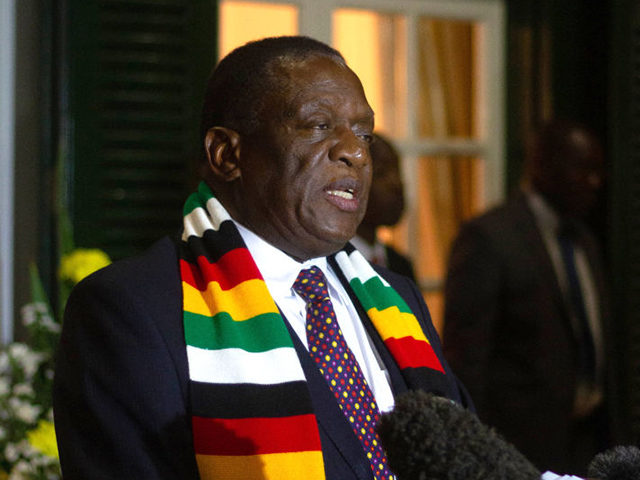Zimbabwe’s socialist strongman President Emmerson Mnangagwa apparently personally approved coal mining by Chinese companies in the country’s Hwange National Park, New Zimbabwe revealed Thursday.
The move aroused concern among park rangers, who said the government did not alert them to any new mining in the park, and environmentalists, who have noted that the park is the largest game reserve in the country and home to a variety of endangered species like rhinoceroses, elephants — an estimated ten percent of the world’s remaining wild population — and lions.
Mnangagwa has maintained the close ties that his socialist state developed with the Communist Party of China (CCP) under predecessor Robert Mugabe, participating in China’s Belt and Road debt trap scheme and granting Chinese companies extensive access to Zimbabwe’s vast resources. China is Zimbabwe’s largest foreign investor; the country received $58 million in Chinese investment grants last year.
Chinese mining, in particular, has triggered outrage among Zimbabwean citizens as Chinese businessmen have faced allegations of racist abuse against locals.
New Zimbabwe carried a statement by the Bhejane Trust, an environmental group that focuses on preserving endangered species in Zimbabwe, detailing how they alerted park rangers to the seemingly illicit presence of Chinese miners in Hwange park and the rangers arrested them.
“Our Rhino monitoring team recently found some Chinese in Hwange National Park. We managed to ascertain they were drilling core samples for coal. Zimparks [Zimbabwe Parks and Wildlife Management Authority] arrested them and took them to police. However, they soon reappeared with a permit giving them the right to carry on in the Park with exploratory drilling,” Bhejane Trust narrated. “They seem to feel they have a right to go wherever they like to. We followed up on this and discovered the Government has allocated two coal mining concessions in the middle of Sinamatela and Robins Camp.”
Bhejane Trust noted that only Mnangagwa can issue such permits, deducing that he must have personally granted the approvals. The two companies now drilling for coal in the national park are Afrochine Energy of the Tsingashan Group of China and Zhongxin Coal Mining Group.
“The issue has raised emotions in Hwange where residents, tour operators and wildlife activists have vowed to block any mining in the national parks to protect wildlife,” New Zimbabwe noted. “Several coal mines operated by Chinese have opened in Hwange around the Hwange Colliery Company concession over the years.”
Mining could significantly alter the landscape of the park and threaten the lives of the endangered species that call it home. The online magazine Quartz noted that Zimbabwean authorities were already under fire this week after park rangers confirmed the deaths of 22 elephants. Experts have not confirmed the cause after rangers found their bodies, though the dominant theory is an unknown bacterial infection killed them.
Environmentalists speaking to the U.K.’s the Guardian expressed alarm at the potential of flooding Zimbabwe’s national parks with Chinese mining and drilling activity.
“This is one of the greatest game parks in the world and the mines would be in one of the most pristine areas of the park. The last black rhino population in Hwange Park lives there, so do 10,000 elephants and 3,000 buffalo,” said Trevor Lane, a veteran member of the Bhejane Trust. “If it goes ahead it will be an end to the park. It would kill the tourist industry which is worth hundreds of millions of dollars.”
Lane said protests would likely erupt and “a lot of people are ready to take action if it goes ahead.”
In response to the uproar, Zimbabwean officials expressed concern for the preservation of the park.
Environment, Climate, Tourism and Hospitality Industry Minister Mangaliso Ndlovu turned to the Chinese state news agency Xinhua to assert that the government was not “keen to disturb a national park” on Thursday.
“We would consider other areas but the discussions are around making sure that we preserve the pristine standing of our national park,” Ndlovu said, promising a new public announcement soon.
Mnangagwa announced a significant expansion of Zimbabwe’s mining industry in August at an event co-sponsored with China, despite a recent harrowing incident in which a Chinese boss shot native workers for asking for the salaries they had been promised.
“We equally look forward to the creation of both direct and indirect jobs as well as empowerment opportunities for associated value chains,” Xinhua quoted the strongman as saying.
In June, the manager of a Chinese-run mine, Zhang Xuelin, reportedly shot two workers, Kennedy Tachiona and Wendy Chikwaira, after Tachoina asked for his salary, which Zhang had refused to pay. Zhang was caught on video shooting Tachiona five times and then shooting at other workers watching in horror, injuring Chikwaira. At the time, CNN detailed other incidents of Chinese worker abuse in the country:
In February, a group of local miners in Matabeleland South province petitioned a labor court to protest their firing by their Chinese employer.
Last April, workers at another Chinese mining operation in the province complained of being underpaid and working without protective clothing.
Several cases of Chinese miners refusing to pay salaries or provide their workers with protective clothing, especially during the [coronavirus] pandemic, are currently being investigated by ZELA [the Zimbabwe Environmental Law Association], according to its deputy director Shamiso Mutisi.
“In many parts of Africa, including Zimbabwe, Chinese mining investors have exhibited a history of bad safety, health, environmental, labor, and human rights standards,” ZELA said in a statement.
China is a signatory to the United Nations Paris Agreement, which aims to reduce global greenhouse gas emissions. The responsibilities of the parties involved end at their borders, however, meaning Chinese coal development abroad would not count towards its greenhouse gas emissions despite the direct relationship between fossil fuels and greenhouse gas emissions.

COMMENTS
Please let us know if you're having issues with commenting.